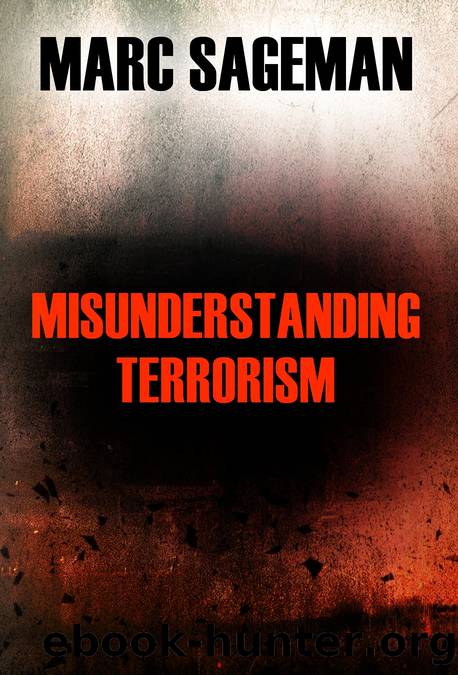Misunderstanding Terrorism by Marc Sageman

Author:Marc Sageman [Sageman, Marc]
Language: eng
Format: epub
Tags: POL000000 Political Science / General
Publisher: University of Pennsylvania Press
Activation of a Politicized Social Identity, Creating an Imagined Community
The first step in the turn to political violence according to the model presented here consists of the activation of a politicized social identity, which generates an imagined political protest community. In the context of an escalating conflict with an out-group (often the state), disillusionment with peaceful protest, and moral outrage at out-group aggression, some militants start thinking of themselves as soldiers protecting their political community. This second self-categorization, into a martial social identity, leads a few to turn to violence in defense of their imagined community. In the following sections, I describe the activation of a politicized social identity and the creation of an imagined discursive political protest community. I then show how the social identity perspective implies a counterintuitive theory of social influence and group dynamics.
Politically violent actors did not always view themselves as political. A politicized social identity is activated and a vague and diffuse political community materializes when a serious political grievance divides people into two contrasting sides. For instance, people with a nonpolitical grievance like students, workers, or citizens gathering for a peaceful demonstration become political when the state intervenes to repress their demonstration with violence. The original grievance loses its importance in the face of violence and activates a politicized social identity in contrast to the state. This aggression against a group, such as using the police to crush a peaceful crowd, shocks potential members of a group into experiencing the attack not as neutral observers but as threatened members of this group. Mass media—and now especially the Internet—facilitate identification with victims abroad. Most global neojihadis I interviewed attributed their politicization to watching videos of slaughtered Muslims in distant lands. Most were not politicized before watching a screening of atrocities committed against Muslims at a meeting or now more commonly watching these videos on their own online. What they saw outraged them and activated self-categorization into an imagined community, which included these victims and which was in contrast with the states committing these atrocities. This self-categorization into a politicized social identity transforms the personal into the political. It does not necessarily involve any ideology, religion, or ethnicity though they may be part of one’s social identity. The Internet makes it much easier to identify with victims abroad based on a commonality, such as ethnicity or religion. When Western powers bomb Muslims in the Middle East, Muslims elsewhere may identify with the victims and become politicized.
We cannot analyze political violence out of context, without looking at out-group intervention, because political actors define themselves in comparison to this out-group and their actions acquire meaning only in the context of its behavior. Any study of political violence thus must be dialectical: it must include both actors and their contrasting out-group. Self-motivated individuals insensitive to their social context suffer from mental disorder, for lack of responsiveness to social cues is part of the definition of such illness. Political assassins whose mental disorder is the major contributor to their act have existed throughout history and act alone because their illness isolates them from others.
Download
This site does not store any files on its server. We only index and link to content provided by other sites. Please contact the content providers to delete copyright contents if any and email us, we'll remove relevant links or contents immediately.
| Arms Control | Diplomacy |
| Security | Trades & Tariffs |
| Treaties | African |
| Asian | Australian & Oceanian |
| Canadian | Caribbean & Latin American |
| European | Middle Eastern |
| Russian & Former Soviet Union |
The Secret History by Donna Tartt(16627)
The Social Justice Warrior Handbook by Lisa De Pasquale(11489)
Thirteen Reasons Why by Jay Asher(7788)
This Is How You Lose Her by Junot Diaz(5774)
Weapons of Math Destruction by Cathy O'Neil(5038)
Zero to One by Peter Thiel(4824)
The Myth of the Strong Leader by Archie Brown(4789)
Promise Me, Dad by Joe Biden(4449)
Beartown by Fredrik Backman(4419)
Stone's Rules by Roger Stone(4416)
How Democracies Die by Steven Levitsky & Daniel Ziblatt(4399)
The Fire Next Time by James Baldwin(4343)
100 Deadly Skills by Clint Emerson(4079)
A Higher Loyalty: Truth, Lies, and Leadership by James Comey(4033)
Rise and Kill First by Ronen Bergman(4012)
The David Icke Guide to the Global Conspiracy (and how to end it) by David Icke(3883)
The Farm by Tom Rob Smith(3872)
Secrecy World by Jake Bernstein(3783)
The Doomsday Machine by Daniel Ellsberg(3731)
